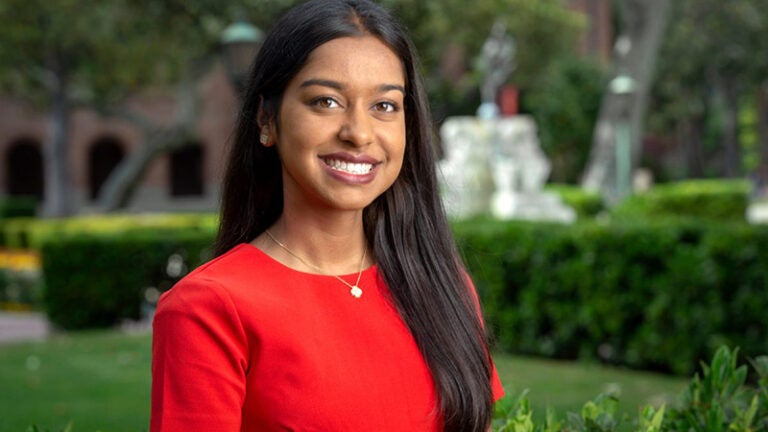
Salutatorian Diviya Gupta wants to make medicine more accessible
Diviya Gupta remembers going for a walk with her grandfather a couple of years ago. They were at a park near his house in Los Alamitos, California, when she started to notice something was off with his gait.
“The way he was walking was very rigid,” she said. Her grandfather, whom she calls “Baba” in Hindi, was around 80 years old at the time.
A few years in as a biological sciences major at USC Dornsife College of Letters, Arts and Sciences, Gupta was studying Parkinson’s disease and specifically looking at how motor coordination like gait was impacted. She got him to schedule an appointment right away.
It turned out he had normal pressure hydrocephalus (NPH), a buildup of fluid in the brain’s ventricles.
Prompted by a desire to help others
Gupta, one of USC’s 2019 salutatorians, always wanted to help people. That was core to her interest in pursuing medicine, first inspiring her curiosity in high school. During her summers, starting when she was 15, she would go to Los Angeles from Huntington Beach a few times a week to study alongside a UCLA neuropathologist. The research looked at how Latinos responded to a common malignant brain tumor called a glioblastoma.
She continued that work at USC while adding on additional research, working with USC Dornsife’s Khalil Iskarous, associate professor of linguistics, and Andrew Gracey, associate professor of biological sciences. Gracey is investigating worms with malfunctioning dopamine for hints into Parkinson’s disease.
Gupta, who plans to attend medical school in the fall, says she wants to continue working with underrepresented populations and making medicine accessible.
“When I came in, I didn’t really know why I wanted to be a physician. I just knew I wanted to help people,” she said. “I think USC taught me how important social responsibility is in the medical profession.”